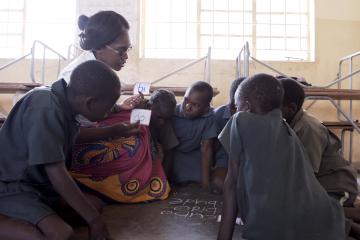Les résultats des évaluations aléatoires modifient notre façon d’appréhender et de traiter les problèmes liés à la pauvreté. Les décideurs politiques, les acteurs de terrain et les donateurs du monde entier sont de plus en plus nombreux à appliquer ces enseignements aux politiques et aux programmes sociaux.
Plus de 600 millions de personnes ont bénéficié directement de programmes et de politiques issus d’évaluations réalisées par des chercheurs affiliés à J-PAL. De nombreuses personnes ont également été touchées grâce aux autres voies par lesquelles les données probantes peuvent contribuer à l’élaboration des politiques, décrites ci-dessous.
Pathways to Policy Change
A federal office to bolster evidence-based policymaking
J-PAL staff and affiliates contributed to the creation of the Office of Evaluation Sciences (OES) to improve the capacity of US federal agencies to build and use rigorous evidence and continue to partner with OES to aid this mission.
A government innovation lab to improve education
With support from J-PAL and IPA, the Ministry of Education in Peru created a dedicated unit to identify, test, and scale low-cost interventions to improve educational outcomes.
Artificial intelligence to strengthen high school students’ writing skills
The state government of Espírito Santo, Brazil applied research findings to scale an AI education technology that gives public school students feedback on their writing, reaching more than 100,000 high school seniors to date.
Communicating Covid-19 messages at scale via social media
Researchers applied insights from earlier Covid-19 messaging research to launch a large-scale Facebook messaging campaign and corresponding evaluation reaching more than 35 million people.
Community chlorine dispensers for better health
Innovative safe drinking water technology has reached 4 million people in Kenya, Malawi, and Uganda.
Community-based targeting to combat Covid-19-induced poverty
Using community targeting methods to distribute cash transfers during Covid-19 has provided relief to over eight million recipients previously unenrolled in any social protection program in Indonesia.
Designing a social protection program during Covid-19
J-PAL affiliated researchers supported the Government of Chile in designing a cash transfer program during the Covid-19 pandemic, which reached over 3 million households.
Déparasiter pour améliorer la fréquentation scolaire
Des recherches ayant démontré que la distribution de comprimés vermifuges dans les écoles des régions où le taux d’infection est particulièrement élevé permettait d’améliorer l’état de santé des élèves et leur fréquentation scolaire, cette approche a été déployée à grande échelle jusqu’à toucher...
Fund flow reform for social program delivery
Central and state governments in India have adopted a financial reform to enhance public service delivery informed by evidence.
Giving directly to support poor households
GiveDirectly has expanded its cash transfer program, which was found in a randomized evaluation to have improved economic and psychological well-being in Kenya, to reach over 125,000 households in rural Kenya, Rwanda, and Uganda since 2013.
Incentivized community grants for aid effectiveness
A performance-incentivized community grant program shown to accelerate improvements in health reached about 4.9 million people from 2010 to 2018 and generated important lessons for future programs to reduce childhood stunting in Indonesia.
Individualized tutoring to improve learning
Saga Education’s intensive math tutoring program has been shown to improve academic outcomes and has now reached 12,000 students facing barriers in the United States.
Information and enforcement to reduce overfishing
Evidence from a randomized evaluation and cost-effectiveness analysis led the Chilean government to expand a consumer information campaign to protect at-risk marine species.
Information and mediation to improve labor courts
The Government of Mexico used insights from a randomized evaluation to inform a national labor law.
Institutionalizing a culture of evidence-informed policymaking in Tamil Nadu
A long-standing partnership between the Government of Tamil Nadu and J-PAL in India has helped institutionalize the use of evidence in decision making and build a culture of evidence-informed policymaking.
Interactive curriculum to reshape gender norms
In India, the state governments of Punjab and Odisha are scaling up an evidence-based gender transformative education program in government schools with the NGO Breakthrough, reaching 4 million students across both states by 2026.
Limits of technological solutions to provider monitoring
Based on evidence that biometric monitoring technology did not increase doctors' attendance at primary health centers, the government of Karnataka decided to end the program, saving taxpayers millions of dollars.
Mobile conditional cash transfers to improve routine childhood immunization
The Health Department of the government of Sindh, Pakistan used rigorous evidence from a randomized evaluation to support the scale-up of an incentive program to increase routine childhood immunization coverage and timeliness.
Normalizing mask usage to combat Covid-19
A community-level mask distribution and promotion program tripled mask usage in Bangladesh and is now being scaled up in multiple countries, reaching almost 14 million people in South Asia so far.
Impliquer les parents d’élèves pour améliorer la scolarité de leurs enfants
Le ministère français de l’Education Nationale a généralisé un programme d’implication des parents d’élèves à tous les établissements scolaires publics du pays sur la base du volontariat.
Phone-based technology for agricultural information delivery
Precision Agriculture for Development leveraged findings from two randomized evaluations to create and diffuse a new mobile-phone based model for agricultural extension.
Promoting housing choice to improve economic mobility
Evidence from a flagship randomized evaluation in the United States prompted legislative and administrative changes to expand housing choice for low-income families.
Providing school quality information to improve housing mobility for low-income families
After research found that providing families with information on school quality increased Housing Choice Voucher recipients’ moves to neighborhoods with higher-rated schools, an affordable housing website expanded the provision of school quality information to all of its 60,000 daily site users.
Simplified reminders to increase take-up of tax credits
Following an evaluation in California testing variations of reminder letters to low-income households to increase take-up of tax credits, the US tax agency scaled up nationally the use of reminders that simply and prominently displayed potential benefits.
Strengthening third-party audits to reduce pollution
Evidence from a randomized evaluation informed the scale-up of a pollution audit policy in Gujarat, India.
Targeted information to improve social assistance
Government scale-up improves access to targeted social programs for 65.67 million people.
Targeting the ultra-poor to improve livelihoods
A multifaceted livelihood program has reached and improved the standard of living for more than three million households across 15 countries following randomized evaluations by J-PAL affiliates.
Tutoring to accelerate learning
Research has shown that high-dosage tutoring helps students catch up. Governments and agencies across the United States are implementing tutoring programs to accelerate learning in the wake of Covid-19.
Les effets inattendus des CV anonymes
Le gouvernement français a abandonné une politique qui aurait contraint les entreprises à prendre leurs décisions de recrutement sur la base de CV anonymes après que des recherches ont montré qu’un projet pilote basé sur le volontariat avait en fait nui aux chances de recrutement des candidats issus...
Utiliser des évaluations d’impact rigoureuses pour favoriser l’accès à l’emploi
Pôle Emploi, l’établissement public chargé de l’emploi en France, a pour pratique d’intégrer les conclusions scientifiques des évaluations aléatoires dans ses décisions stratégiques afin d’améliorer la situation professionnelle des demandeurs d’emploi sur tout le territoire français.
Policymaker Voices
Enhancing Delivery through Financial Reform of MGNREGS
Using Identification Cards to Improve National Social Assistance in Indonesia
Resources
La page « Des résultats aux politiques » contient des ressources et des outils destinés aux décideurs politiques, aux acteurs de terrain, aux donateurs et à toute autre personne désireuse d’exploiter des données probantes en vue d’élaborer des politiques sociales. Vous y trouverez des conseils pratiques pour adapter les résultats des évaluations d’un contexte à un autre, déterminer si un programme est prêt à être mis à l’échelle, favoriser une culture de l’utilisation des preuves au sein des organisations, et bien d’autres choses encore. Voir toutes les ressources.


